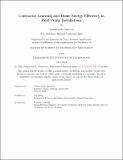| dc.contributor.advisor | Zheng, Siqi | |
| dc.contributor.author | Ontiveros, Johnattan H. | |
| dc.date.accessioned | 2024-09-24T18:27:16Z | |
| dc.date.available | 2024-09-24T18:27:16Z | |
| dc.date.issued | 2024-05 | |
| dc.date.submitted | 2024-07-25T14:17:40.317Z | |
| dc.identifier.uri | https://hdl.handle.net/1721.1/157022 | |
| dc.description.abstract | The displacement of fossil-fuel based heating is essential for achieving decarbonization in the building sector, which represents about a third of national emissions in the United States. Electric heat pumps are the primary technology needed to do so, but widespread adoption is hindered by a variety of factors including higher upfront costs and a shortage of experienced labor to fulfill installations. This work examines the role of learning on the cost and size of heat pump installations throughout the Massachusetts Clean Energy Center (MassCEC) rebate program. We find that as contractors gain experience, heating systems are downsized at the cost of less hours of displaced fossil-fuel based heating. This learning impact is strongest for homes with a natural gas backup heater, which is the cheapest source of heating in Massachusetts followed by electric heat pump heating. We then analyze the structure of the MassCEC rebate, and its potential influence on the benefits of the program. | |
| dc.publisher | Massachusetts Institute of Technology | |
| dc.rights | Attribution-NonCommercial-NoDerivatives 4.0 International (CC BY-NC-ND 4.0) | |
| dc.rights | Copyright retained by author(s) | |
| dc.rights.uri | https://creativecommons.org/licenses/by-nc-nd/4.0/ | |
| dc.title | Contractor Learning and Home Energy Efficiency in Heat Pump Installations | |
| dc.type | Thesis | |
| dc.description.degree | S.M. | |
| dc.contributor.department | Massachusetts Institute of Technology. Institute for Data, Systems, and Society | |
| mit.thesis.degree | Master | |
| thesis.degree.name | Master of Science in Technology and Policy | |
